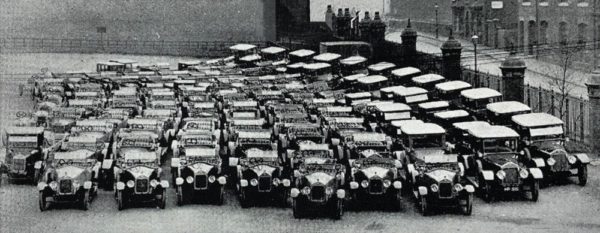
This image illustrated a magazine article from March 1921, praising the courage and vision of Wolseley’s managing director Arthur McCormack. The United Kingdom, United States and other countries were mired in a severe post-war recession that lasted from January 1920 to July 1921 – yet the company had decided upon a ‘bold policy of large scale production’.
Wolseley were thus turning out well over a hundred cars per week, according to the article. This caused surprise and admiration: how could Wolseley achieve this with ‘high grade’ cars, at a time when Henry Ford had been compelled to reduce output of much cheaper vehicles?
The article gave a few insights. Firstly, the Wolseley Company was reported to have developed three relativey new models, fitted to the motoring needs of the day: 10 h.p., 15 h.p. and 20 h.p. They were said to be notable for their moderate power, high efficiency, great reliability, and economy of upkeep.
The company had also set out their stall to achieve economies of scale, using modern machinery – although far from mass production. They were also praised for their extensive sales operation that could take advantage of the quality of the cars and the freshness of their range.
The caption to the illustration read: ‘A Batch of Wolseley Cars Ready for Delivery to Their Owners’. The tone of the article reflected the undoubtedly serious economic conditions, but was full of optimism for the future, based in no small part on the qualities of people such as McCormack.
Picture courtesy of the Richard Roberts Archive







Leave a Comment